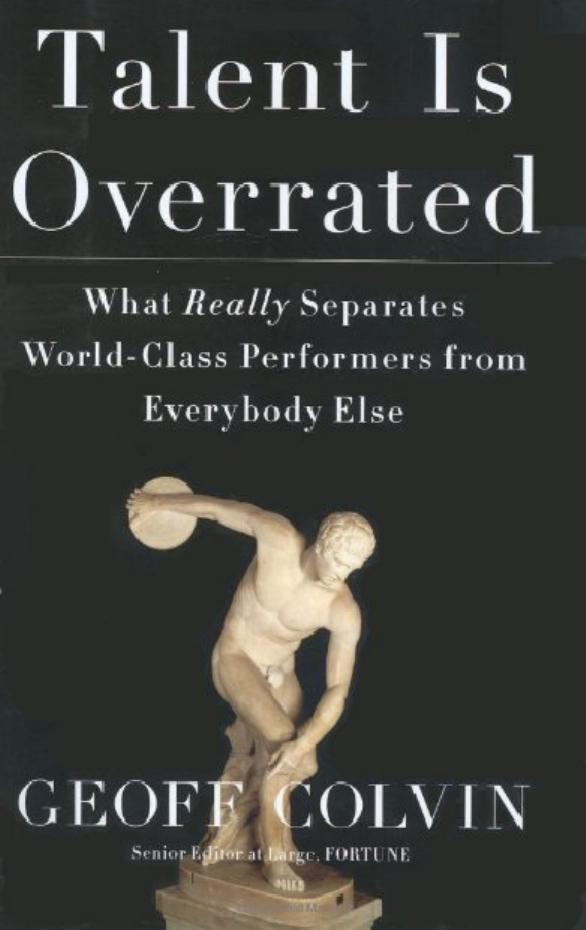Talent Is Overrated: What Really Separates World-Class Performers from Everybody Else by Geoff Colvin

Author:Geoff Colvin
Language: eng
Format: mobi, pdf
Tags: Industrial & Organizational Psychology, Human Resources & Personnel Management, Psychology, General, Careers, Self-Help, Personal Growth, Business & Economics
ISBN: 9781591842941
Publisher: Penguin Group USA
Published: 2010-05-24T22:00:00+00:00
Chapter Seven - Applying the Principles in Our Lives
The opportunities are many - if we think about our work in a new way.
Benjamin Franklin was "America's first great man of letters" in the view of David Hume and many others, so we might naturally wonder how he came to be the extraordinary writer he was. His own account of it in his autobiography is well known—most of us read it in school—but in light of what we now know about how great performers develop, several elements of the story seem more significant and instructive than we may have realized.
As a teenager, Franklin seemed to think he wrote well enough, but then one day his father found an exchange of letters between Ben and a friend, John Collins, arguing a point back and forth. (The argument was whether women should be educated, Collins contending they were naturally unable to learn as much as men, Franklin taking the other side.) Ben's father first told his son what was good about his letters; they were better than Collins's in spelling and punctuation. Then he told him and showed him specifically how they were inferior: "in elegance of expression, in method and in perspicuity, of which he con vinced me by several instances," as Franklin recalled. We must note in passing that when it comes to giving people evaluations—offering praise first, then supporting criticisms with examples—old Josiah Franklin could be a model for us all.
Ben responded to his father's observations in several ways. First, he found examples of prose clearly superior to anything he could produce, a bound volume of the Spectator, the great English periodical written by Joseph Addison and Richard Steele. Any of us might have done something similar. But Franklin then embarked on a remarkable pro gram that few of us would ever have thought of.
It began with his reading a Spectator article and making brief notes on the meaning of each sentence; a few days later he would take up the notes and try to express the meaning of each sentence in his own words. When done, he compared his essay with the original, "discovered some of my faults, and corrected them."
One of the faults he noticed was his poor vocabulary. What could he do about that? He realized that writing poetry required an extensive "stock of words" because he might need to express any given meaning in many different ways depending on the demands of rhyme or meter. So he would rewrite Spectator essays in verse. Then, after he had for gotten them, he would take his versified essays and rewrite them in prose, again comparing his efforts with the original.
Franklin realized also that a key element of a good essay is its organization, so he developed a method to work on that. He would again make short notes on each sentence in an essay, but would write each note on a separate slip of paper. He would then mix up the notes and set them aside for weeks, until he had forgotten the essay.
Download
Talent Is Overrated: What Really Separates World-Class Performers from Everybody Else by Geoff Colvin.pdf
This site does not store any files on its server. We only index and link to content provided by other sites. Please contact the content providers to delete copyright contents if any and email us, we'll remove relevant links or contents immediately.
The Motivation Myth by Jeff Haden(5214)
Audition by Ryu Murakami(4933)
Adulting by Kelly Williams Brown(4579)
The Confidence Code by Katty Kay(4265)
A Mind For Numbers: How to Excel at Math and Science (Even If You Flunked Algebra) by Barbara Oakley(3309)
Waiting in the Wings by Melissa Brayden(3220)
Self-Esteem by Matthew McKay & Patrick Fanning(3145)
Fooled by Randomness: The Hidden Role of Chance in Life and in the Markets by Nassim Nicholas Taleb(3125)
The ONE Thing by Gary Keller(3074)
Nice Girls Don't Get the Corner Office by Lois P. Frankel(3048)
The Dictionary of Body Language by Joe Navarro(2999)
How to be More Interesting by Edward De Bono(2794)
Designing Your Life by Bill Burnett(2748)
Getting Things Done by David Allen(2701)
The Plant Paradox by Dr. Steven R. Gundry M.D(2627)
Police Exams Prep 2018-2019 by Kaplan Test Prep(2550)
What Color Is Your Parachute? 2015 by Richard N. Bolles(2313)
Dangerous Personalities by Joe Navarro(2290)
When to Jump by Mike Lewis(2242)
